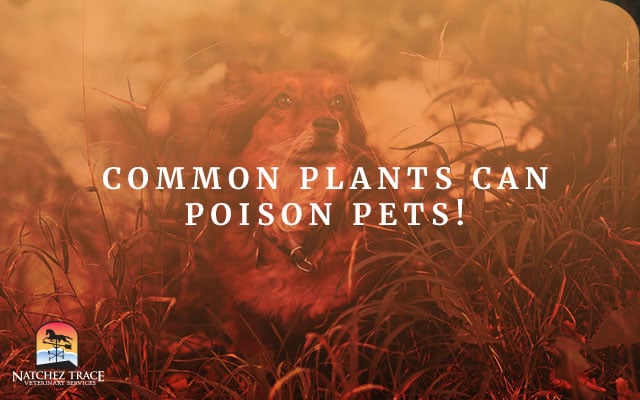Let’s talk about pet poison.
Many plants and trees can harm your pet if they are eaten. Here is a list of some plants found in and around the home that can cause severe illness for your dog or cat.
At Natchez Trace Veterinary Services, our goal is to keep your pet happy and healthy! To keep your pet healthy and happy, it is important to know what dangers may be lurking in and around your home.
Plants That Can Cause Heart Damage
- Lilly of the Valley
- Oleander
- Rhododendron
- Azalea
- Yew
- Foxglove
- Kalanchoe
Plants That Can Cause Kidney Failure
- Rhubarb leaves
- Shamrock
- Lilies (especially in cats)
- Castor bean (Ricinus species) – can also cause convulsions and death
Plants That Can Cause Liver Failure
- Sago palms
- Cycad palms
- Some species of mushrooms
That Cause Multiple Effects (Abdominal Pain, Vomiting, Depression, Weakness, Drooling, Loss of Appetite, Incoordination, Elevated Heart Rate, Dilated Pupils)
- Aloe
- Autumn Crocus
- Calla Lily
- Corn plant
- Chrysanthemum
- English Ivy
- Ribbon plant
- Dracaena species
This is just a short list of common plant toxicities. Follow the link below to go to a huge, searchable list of plants to make sure your home is safe! (This searchable list contains plants that have been reported as having systemic effects on animals and/or intense effects on the gastrointestinal tract.)
If you think that your animal is ill or may have ingested a poisonous substance, contact your local veterinarian or our 24-hour emergency poison hotline directly at 1-888-426-4435.
Click Here for the ASCPA List of Toxic and Non-Toxic Plants
ASPCA Animal Poison Control Center Hotline (888) 426-4435
Let us help you keep your pet healthy and happy! Visit our office for a pet health consultation. We are always glad to help!
- Natchez Trace Veterinary Services (Belle Meade) (615) 750-2248
- Natchez Trace Veterinary Services (Franklin) (615) 790-8100
Source: ASCPA Animal Poison Control Center








